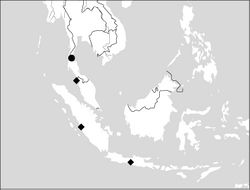Metallanchista laticollis
| Notice: | This page is derived from the original publication listed below, whose author(s) should always be credited. Further contributors may edit and improve the content of this page and, consequently, need to be credited as well (see page history). Any assessment of factual correctness requires a careful review of the original article as well as of subsequent contributions.
If you are uncertain whether your planned contribution is correct or not, we suggest that you use the associated discussion page instead of editing the page directly. This page should be cited as follows (rationale):
Citation formats to copy and paste
BibTeX: @article{Shi2013ZooKeys284, RIS/ Endnote: TY - JOUR Wikipedia/ Citizendium: <ref name="Shi2013ZooKeys284">{{Citation See also the citation download page at the journal. |
Ordo: Coleoptera
Familia: Carabidae
Genus: Metallanchista
Name
Metallanchista laticollis Shi & Liang sp. n. – Wikispecies link – ZooBank link – Pensoft Profile
Type material
Holotype (NHMB): male, body length = 7.8 mm, board mounted, genitalia dissected and deposited in microvial pinned under specimen, “Thailand, 1.-20.iii.1996 / Chumphon prov. / Pha To env. 9°48’ 98°47’ / K. Majer leg.”; “HOLOTYPE ♂/ Metallanchista laticollis / new species / Des. SHI H. L. 2011” [red label][Figs 44, 75, 99].
Diagnosis
Elytra uniform metallic piceous–green, intervals slightly convex; pronotal width 1.65 times length, lateral margins slightly angulate in middle, front angles with only a few very short setae. This species is similar to Metallanchista perlaeta, but can be distinguished from the latter by pronotal lateral margins angulate in middle and dorsal side with less metallic color.
Description
Body length 7.8 mm; dorsum piceous, head and pronotum with moderate reflection, pronotum slightly brownish, elytra dark green, with strong metallic reflection; antennae, mouthparts yellowish brown, apices of mandibles darker, apices of terminal labial and maxillary palpomeres yellow; femora dark brown, tibiae and tarsomeres reddish brown; ventrum brown. Head glabrous, without microsculpture or punctures. Pronotum strongly transverse, widest slightly before middle; lateral explanate areas very wide and even, with a few punctures; ratio PW/PL 1.65; pronotal base briefly but distinctly lobed; disc moderately convex, microsculpture indistinct, without punctures or pubescence; front angles with a few very short setae; lateral margins slightly angulate in middle, strongly sinuate before hind angles; hind angles obtuse, sharp, not projected, with a few accessory setae; basal foveae shallow, with a few punctures; median line distinct, short, not reaching to base. Elytra with striae shallow, distinct, finely punctate; intervals slightly convex; microsculpture absent; 3rd interval with two setigerous pores, the basal one placed at basal one-third approximately, adjacent to 3rd stria, the apical one placed at apical one-eighth approximately, adjacent to 2nd stria; 5th interval with one setigerous pore near base. Male genitalia with median lobe of aedeagus tubular, slightly compressed; left lateral margin not curved, right lateral margin gently expanded in dorsal view; apical orifice opened dorsally, margin around apical orifice without long setae; apical lamella placed on right side, flat and elongate, apex rounded, length twice width; apical lamella strongly bent dorsally in lateral view; subapical area finely setose on right side. Internal sac without distinct sclerite; two separate areas near to dorsal margin strongly and coarsely scaled, basal one smaller and more coarsely scaled; main flagellum and trumpet-form expansion reduced to a hardly visible semi-sclerotized sclerite near base (Fig. 75). Female genitalia unknown.
Distribution
(Map 4). Only known from the type locality PhaTo (Thailand).
Etymology
The name “laticollis” is from the Latin “lat-” meaning wide and “coll” meaning neck, referring to the pronotum. This species is named for its rather wide pronotum.
Original Description
- Shi, H; Zhou, H; Liang, H; 2013: Taxonomic synopsis of the subtribe Physoderina (Coleoptera, Carabidae, Lebiini), with species revisions of eight genera ZooKeys, 284: 1-129. doi
Images
|
![Figures 43–48. Type materials, scale bars = 2.0 mm: 43 Holotype of Anchista pilosa sp. n. 44 Holotype of Metallanchista laticollis sp. n. 45 Holotype of Diamella kaszabi Jedlička [= Diamella kaszabi (Jedlička)] 46 Lectotype of Calleida cupreomicans Oberthür [= Diamella cupreomicans (Oberthür)] 47 Lectotype of Allocota aerata Bates [= Diamella cupreomicans (Oberthür)] 48 Holotype of Lachnoderma arrowi Jedlička [= Diamella arrowi (Jedlička)].](https://species-id.net/o/thumb.php?f=ZooKeys-284-001-g008.jpg&width=237)


